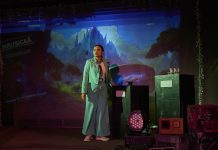Fifty years ago Rolling Stone reported completion of a new album by Pete Townshend and called it “probably the most important milestone in pop since Beatlemania. For the first time, a rock group has come up with a full-length cohesive work that could be compared to the classics.” The effusive praise was prescient. Tommy became a sensation. And as the eye-popping and robust new production at Kennedy Center suggests, what Tommy has to say today may be even more significant than then.
The Who’s Tommy, as it’s now called, is a sung-through rock opera about a “deaf, dumb, and blind kid” in the 1940s who becomes such a phenomenal “pinball wizard” that people begin to believe he is their spiritual leader. The show opened last night in the Eisenhower Theater to a rapturous standing ovation as part of the Broadway Center Stage series.
“Broadway Center Stage performances,” we are advised, “are presented as semi-staged concerts. The actors will carry scripts in hands for various scenes of their performance”—which turns out to be gloriously untrue. Not a script in sight. Nothing semi about it. This production pulls out all the stops, pushes all the right buttons, flips all the right flippers, and scores a powerball of a show.
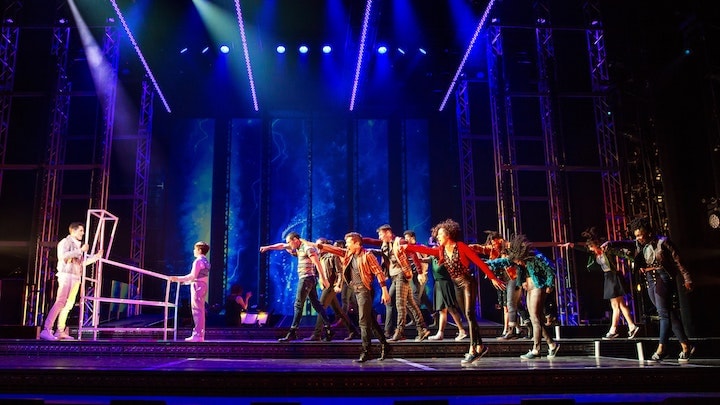
Set and Projection Designer Paul DePoo erects a massive structure of girders astride a stepped stage and floods the upstage wall with stunning story-propelling imagery—from grim World War II bombers to a flashy pinball arcade to the haunting eyes of a lonely child. He also gives the actors multiple white-framed set pieces that, moved around from scene to scene (not quite yet smoothly), function as tables, doorways, a pinball machine, and more.
The show seems just as fully conceived as a hit musical on tour, an effect made blazingly visible in Lighting Designer Jake DeGroot eye-glazing bright colors and animated strip lighting. At times it’s as if we’re inside a pinball machine. The full orchestra, conducted with punch and precision by Musical Director Lynne Shankel, is situated in pits upstage, which lends a rock-concert feel to the showier numbers. And in a vast auditorium where acoustics can be iffy, Sound Designer Kai Harada has worked some kind of magic that makes the actors’ voices come through clear as a bell in perfect balance with the band.
Casey Cott, known to fans of the CW series Riverdale, gives a muscular and winning performance as grown-up Tommy and brings a strong voice that especially impresses on his rocker vocals. Tommy at age 4 is played by Declan Fennell and Tommy at age 10 is played by Hudson Loverro; their lovely voices, vulnerability, and stoic isolation are highlights of the show.
As Tommy’s father and mother, big-musical veterans Christian Borle (Captain Walker) and Mandy Gonzalez (Mrs. Walker) each bring affecting parental compassion to their roles. Gonzalez’s vocals are particularly rich, and Borle handles Captain Walker’s challenging character arc with great grace.
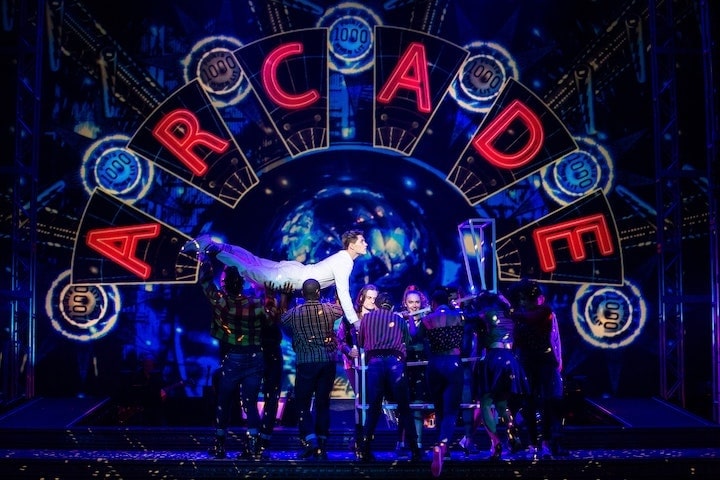
Townshend, who wrote the music and lyrics and coauthored the book with Des McAnuff, built into the musical a childhood for Tommy that shocks and disturbs still today: Captain Walker goes off to war leaving his wife pregnant; while he’s away she gives birth to Tommy. Then, believing her husband has been killed in combat, she takes a Lover (Rory Donovan). Captain Walker returns unannounced, finds his wife in another man’s embrace, and shoots the Lover dead. Four-year-old Tommy witnesses the murder, reflected in a mirror. His mother and father order him not to say anything about what he has seen. So traumatized is Tommy that he becomes deaf, dumb, and blind on the spot. Subsequently he is sexually abused by his father’s brother, Uncle Ernie (Manu Narayan, whose dulcet pipes contrast starkly with the character’s dark heart), and sadistically tormented by his Cousin Kevin (a nimbly malevolent Wesley Taylor).
Besides Tommy’s great classic-rock score, and despite the troubling underpinnings of its plot, Tommy is chock full of entertaining song-and-dance numbers, and Director and Choreographer Josh Rhodes puts the energetic young cast through their paces way more ambitiously than “semi-staged concert” would suggest (at times perhaps too ambitiously; the choreography on opening night was not yet tight). The cast of characters is large (see credits below) and their voices are uniformly excellent. The choral and duet work is wonderful—as when grownup Tommy sings to and with his younger self. A few solos that stood out were the vocal star turns of the high-strutting Kimberly Nichole as The Gypsy (to whom 10-year-old Tommy is nearly forced to go for sexual initiation) and the elegantly dreadlocked Mykal Kilgore (in multiple vivid roles). On opening night the audience didn’t audibly respond until The Gypsy’s show-stopping scene about 45 minutes in, and from then on the joint was jumping, culminating in a rock-concert-slash-revival-meeting starring rocker Cott that lifted everyone to their feet.
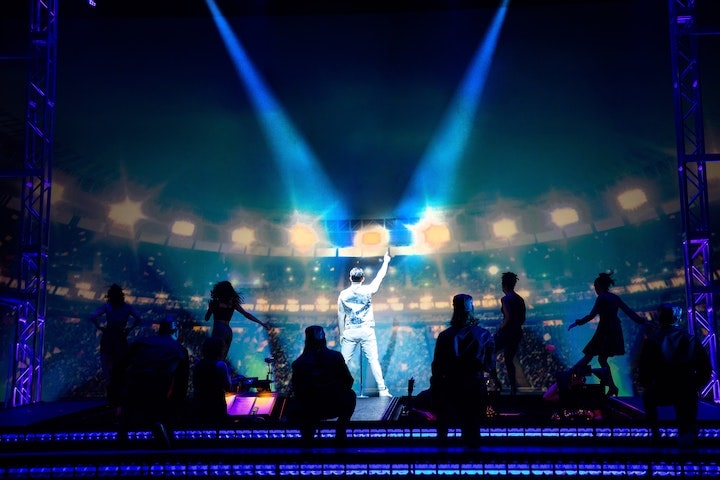
The narrative embedded in Tommy of a traumatic childhood was prompted by Townshend’s own. As he disclosed in his 2012 autobiography, around the time he was 6, he was sexually abused by an uncle. Recently Townshend has acknowledged that he cannot even perform Tommy in its entirety anymore. The last time he tried, two years ago at Royal Albert Hall, he suffered what he described as “a mental crash” halfway through.
I had a flashback to childhood abuse. The second night was OK, but the first night I nearly walked off the stage…which would have been awful. I wasn’t playing very well and I was feeling dizzy. I almost blacked out and it was just horrible. I don’t know where it came from because I’ve been working with Tommy. I’ve been investigating it — where it comes from in my life and childhood, writing about it in my biography. So it was quite a shock.
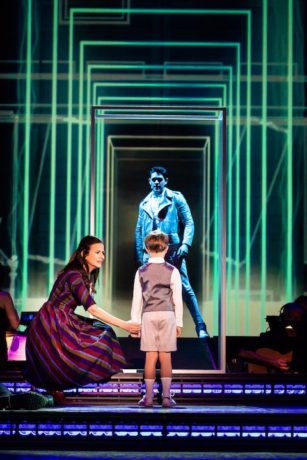
The conversation around the trauma of childhood abuse has enlarged and deepened in the 50 years since Tommy premiered, and so there are aspects of the show that now must be handled with newfound sensitivity—not only because the incidents could be triggering but because the well-being of two child actors is at stake. Director and Choreographer Rhodes has staged the scenes involving both Cousin Ernie’s “fiddling about” with young Tommy and Cousin Kevin’s tormenting with enormous care, a kind of PG decorum actually, which today seems absolutely fitting.
What this directorial approach means for how the story plays in this production is interesting. Far from blunting dramatic impact, it makes us care about Tommy all the more. Our apprehension about the welfare of the child actors translates into intensified concern for Tommy the character, which carries over into our emotional identification with Cott’s grownup Tommy.
There’s a marvelous moment when Tommy age 4 walks through a white frame box and out the other side walks Tommy age 10. And at the end all three Tommys are brightly spotlit inside three such boxes. Though they are separated, the congruence among them is deeply moving.
Tommy’s life touches the hurt child still in us all and lets us know we’ll be okay.
Running Time: Approximately two hours, including one intermission.
Broadway Center Stage: The Who’s Tommy plays through April 29, 2019, at the John F. Kennedy Center for the Performing Arts Eisenhower Theater — 2700 F Street, NW in Washington, DC. Tickets may be purchased at the Kennedy Center Box Office, by calling 202-467-4600 or 800-444-1324, or online.
CREDITS
Music and Lyrics by Pete Townshend
Book by Pete Townshend and Des McAnuff
Additional Music and Lyrics by John Entwistle and Keith Moon
Directed and Choreographed by Josh Rhodes
Musical direction by Lynne Shankel
Scenic and projection design by Paul DePoo
Costume design by Andrea Hood
Lighting design by Jake DeGroot
Sound design by Kai Harada
Cast (in order of appearance)
Tommy: Casey Cott
Captain Walker: Christian Borle
Mrs.Walker: Mandy Gonzalez
Uncle Ernie: Manu Narayan
The Gypsy: Kimberly Nichole
Cousin Kevin: Wesley Taylor
Minister: Charl Brown
Officer #1: Mykal Kilgore
Officer #2: Kaleb Wells
Nurses: Taylor Iman Jones, Tiernan Tunniclife, Trina Mills
Allied Soldier #1: Nick Martinez
Allied Soldier #2: Michael Milkanin
Lover: Rory Donovan
Tommy, Age 4: Declan Fennell
Judge: Michael Milkanin
Tommy, Age 10: Hudson Loverro
Cousin Kevin’s Mom: Samantha Gershman
Hawker: Mykal Kilgore
Harmonica Player: Rory Donovan
Allied Soldier #2: Michael Milkanin
Lover: Rory Donovan
Tommy, Age 4: Declan Fennell
Judge: Michael Milkanin
Tommy, Age 10: Hudson Loverro
Cousin Kevin’s Mom: Samantha Gershman
Hawker: Mykal Kilgore
Harmonica Player: Rory Donovan
First Pinball Lad: Nick Martinez
Second Pinball Lad: Kaleb Wells
Specialist: Charl Brown
Specialist’s Assistant: Tiernan Tunniclife
Sally Simpson: Taylor Iman Jones
DJ: Olutayo Bosede
Local Lads, Lasses, Reporters, Ensemble: Olutayo Bosede, Charl Brown, Rory Donovan, Samantha Gershman, Taylor Iman Jones, Mykal Kilgore, Nick Martinez, Michael Milkanin, Trina Mills, Khori Petinaud, Tiernan Tunnicliffe, MathewVarvar, Kaleb Wells, Sharrod Williams, Kristin Yancy
Orchestra
Drums: Joe Mowatt
Electric Bass: Paul Henry
Guitar: Manny Moreira, Jim Roberts
Horn: Geoffrey Pilkington
Keyboard: Michael Gacetta, Anthony Nalker, Alex Tang



